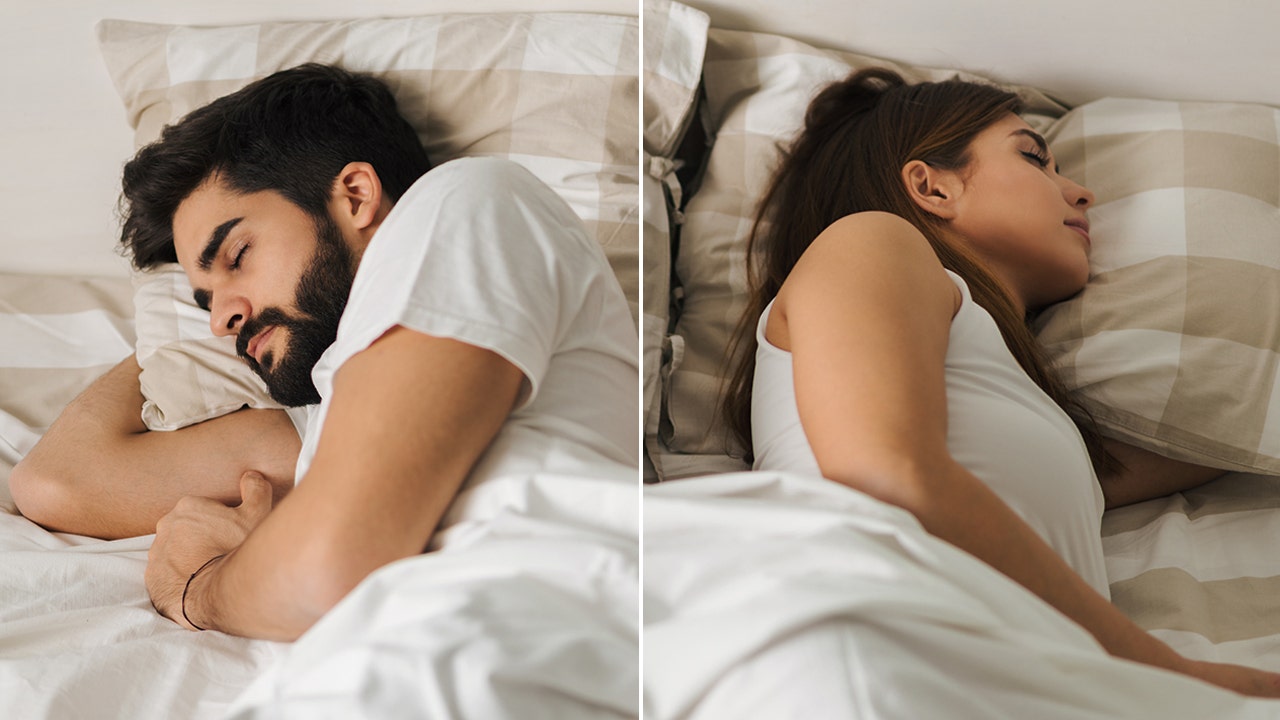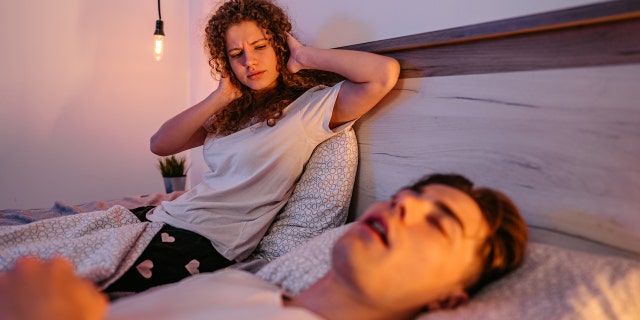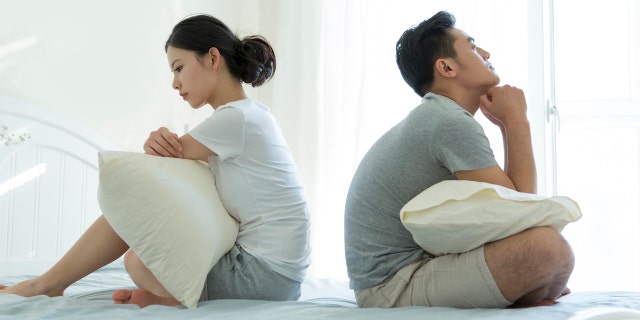Health
‘Sleep divorce’: Why are some couples spending their nights in separate beds?

For many couples, it seems “for better or for worse” does not include tossing and turning during the night.
A growing number of Americans are opting to leave the marital bed in exchange for a better night’s sleep elsewhere in the home — a scenario that some call a “sleep divorce.”
More than a third of people say they “occasionally or consistently” sleep in a different room than their partner, according to a recent survey by the American Academy of Sleep Medicine (AASM) in Illinois.
PARTY OF ONE: WHY BRIDES ARE GOING ON SOLO BACHELORETTE TRIPS AHEAD OF THEIR WEDDING DAY
“We know that poor sleep can worsen your mood, and those who are sleep-deprived are more likely to argue with their partners,” said Dr. Seema Khosla, pulmonologist and spokesperson for the AASM, in a press release announcing the findings.
“There may be some resentment toward the person causing the sleep disruption, which can negatively impact relationships.”
A growing number of Americans are opting to leave the marital bed in exchange for a better night’s sleep elsewhere in the home — a scenario that some call a “sleep divorce.” (iStock)
“Getting a good night’s sleep is important for both health and happiness, so it’s no surprise that some couples choose to sleep apart for their overall well-being,” she continued.
Men were more likely to sleep elsewhere, with 45% of them saying they do so “occasionally or consistently,” compared to 25% of women.
HOW DO I STOP SNORING? NATURAL TREATMENTS COULD REDUCE THE SOUND
“Although the term ‘sleep divorce’ seems harsh, it really just means that people are prioritizing sleep and moving into a separate room at night when needed,” said Khosla in the release.
“However, if it is one partner’s loud snoring that is leading to separate sleep spaces, then you should encourage that partner to talk to a doctor about obstructive sleep apnea,” she said.

Snoring is one of the main reasons that couples sleep in separate beds, a psychologist said. (iStock)
There is a common perception that if couples are sleeping in separate beds or rooms, their relationships must be on the rocks, noted Dr. Brandy Smith, a licensed psychologist with the virtual health care company Thriveworks — but that’s not always the case, she said.
“While it’s true that sometimes it’s indicative of a problem, it is not always a red flag,” Virginia-based Smith, who specializes in relationships and couples counseling, told Fox News Digital.
BIDEN HAS SLEEP APNEA: WHAT IS IT?
The most common reasons she’s heard from patients are snoring, frequent movements that keep one partner awake or wake them too often throughout the sleep cycle, mismatched sleep/wake cycles and schedule differences, said Smith.
“Getting a good night’s sleep is important for both health and happiness, so it’s no surprise that some couples choose to sleep apart for their well-being.”
One woman on Reddit described how sleeping apart has worked for her marriage.
“My husband and I have been married for 20 years. We have a great relationship. The last five years, we have had our own bedrooms,” she wrote.
“He likes to sleep with the TV on all night and a bright nightlight and a warm room. I like total darkness and total quiet and about 5 degrees cooler. We each just get better sleep on our own.”
DANGERS YOU CAN’T SEE MAY BE LURKING IN YOUR UNWASHED BEDDING: BEWARE THE ‘HEALTH CONCERNS’
Another Reddit user claimed that without separate bedrooms, their relationship would have ended a long time ago.
“We are just not sleep compatible,” the user wrote. “Be it different schedules, my snoring … my desire for white noise, etc.”

There is a common perception that if a couple is sleeping in separate beds or rooms, the relationship must be on the rocks — but that’s not always the case, said a licensed psychologist. (iStock)
The person added, “When one or both partners are not getting proper sleep and blame the other one, that can tear relationships apart. It just slowly builds resentment.”
One man, however, shared that his “sleep divorce” started about a year prior to the real divorce from his ex-wife.
“Turns out, the further away you sleep from someone you just can’t stand anymore, the better your sleep is,” he wrote.
CLICK HERE TO SIGN UP FOR OUR HEALTH NEWSLETTER
For couples who would rather not sleep apart, Smith said there are other options to ensure healthy sleep.
“Given the concerns I have heard, options to consider have usually fallen into one of two categories,” she said.
“One is a health consultation to see if any medical treatments can reduce snoring or bodily movements, or the couple might explore schedule changes so that sleep/wake schedules overlap more.”

Health
Semaglutide Pills and Injections Vs. Drops: Experts Weigh In | Woman's World

Sign Up
Create a free account to access exclusive content, play games, solve puzzles, test your pop-culture knowledge and receive special offers.
Already have an account? Login
Use left and right arrow keys to navigate between menu items.
Use escape to exit the menu.
Health
Jennifer Hudson Lost 80-Lbs Without Depriving Herself—Learn Her Secrets

Sign Up
Create a free account to access exclusive content, play games, solve puzzles, test your pop-culture knowledge and receive special offers.
Already have an account? Login
Use left and right arrow keys to navigate between menu items.
Use escape to exit the menu.
Health
Kennedy’s Plan for the Drug Crisis: A Network of ‘Healing Farms’

Though Mr. Kennedy’s embrace of recovery farms may be novel, the concept stretches back almost a century. In 1935, the government opened the United States Narcotic Farm in Lexington, Ky., to research and treat addiction. Over the years, residents included Chet Baker and William S. Burroughs (who portrayed the institution in his novel, “Junkie: Confessions of an Unredeemed Drug Addict”). The program had high relapse rates and was tainted by drug experiments on human subjects. By 1975, as local treatment centers began to proliferate around the country, the program closed.
In America, therapeutic communities for addiction treatment became popular in the 1960s and ’70s. Some, like Synanon, became notorious for cultlike, abusive environments. There are now perhaps 3,000 worldwide, researchers estimate, including one that Mr. Kennedy has also praised — San Patrignano, an Italian program whose centerpiece is a highly regarded bakery, staffed by residents.
“If we do go down the road of large government-funded therapeutic communities, I’d want to see some oversight to ensure they live up to modern standards,” said Dr. Sabet, who is now president of the Foundation for Drug Policy Solutions. “We should get rid of the false dichotomy, too, between these approaches and medications, since we know they can work together for some people.”
Should Mr. Kennedy be confirmed, his authority to establish healing farms would be uncertain. Building federal treatment farms in “depressed rural areas,” as he said in his documentary, presumably on public land, would hit political and legal roadblocks. Fully legalizing and taxing cannabis to pay for the farms would require congressional action.
In the concluding moments of the documentary, Mr. Kennedy invoked Carl Jung, the Swiss psychiatrist whose views on spirituality influenced Alcoholics Anonymous. Dr. Jung, he said, felt that “people who believed in God got better faster and that their recovery was more durable and enduring than people who didn’t.”
-
/cdn.vox-cdn.com/uploads/chorus_asset/file/25822586/STK169_ZUCKERBERG_MAGA_STKS491_CVIRGINIA_A.jpg)
/cdn.vox-cdn.com/uploads/chorus_asset/file/25822586/STK169_ZUCKERBERG_MAGA_STKS491_CVIRGINIA_A.jpg) Technology1 week ago
Technology1 week agoMeta is highlighting a splintering global approach to online speech
-

 Science1 week ago
Science1 week agoMetro will offer free rides in L.A. through Sunday due to fires
-
/cdn.vox-cdn.com/uploads/chorus_asset/file/23935558/acastro_STK103__01.jpg)
/cdn.vox-cdn.com/uploads/chorus_asset/file/23935558/acastro_STK103__01.jpg) Technology1 week ago
Technology1 week agoAmazon Prime will shut down its clothing try-on program
-

 News1 week ago
News1 week agoMapping the Damage From the Palisades Fire
-
/cdn.vox-cdn.com/uploads/chorus_asset/file/25826211/lorealcellbioprint.jpg)
/cdn.vox-cdn.com/uploads/chorus_asset/file/25826211/lorealcellbioprint.jpg) Technology7 days ago
Technology7 days agoL’Oréal’s new skincare gadget told me I should try retinol
-
/cdn.vox-cdn.com/uploads/chorus_asset/file/25832751/2192581677.jpg)
/cdn.vox-cdn.com/uploads/chorus_asset/file/25832751/2192581677.jpg) Technology3 days ago
Technology3 days agoSuper Bowl LIX will stream for free on Tubi
-

 Business5 days ago
Business5 days agoWhy TikTok Users Are Downloading ‘Red Note,’ the Chinese App
-
/cdn.vox-cdn.com/uploads/chorus_asset/file/25835602/Switch_DonkeyKongCountryReturnsHD_scrn_19.png)
/cdn.vox-cdn.com/uploads/chorus_asset/file/25835602/Switch_DonkeyKongCountryReturnsHD_scrn_19.png) Technology1 day ago
Technology1 day agoNintendo omits original Donkey Kong Country Returns team from the remaster’s credits














